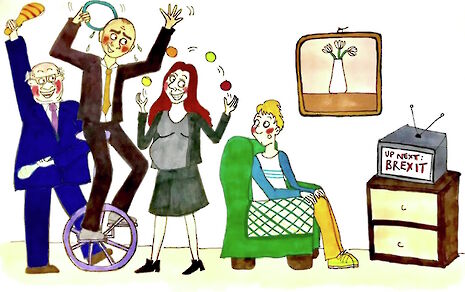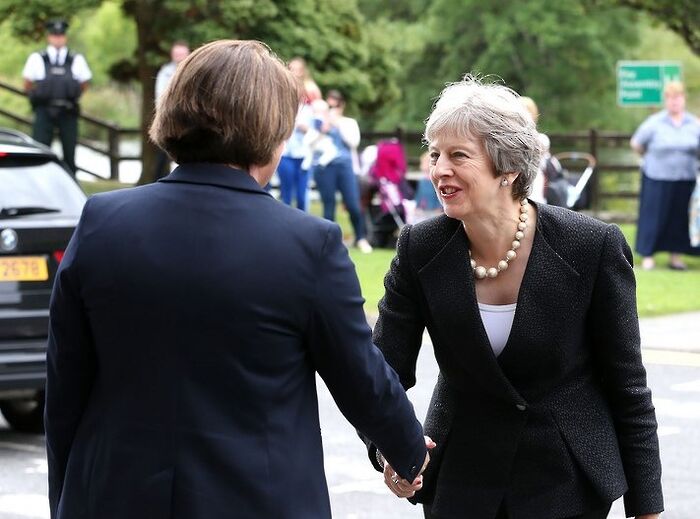Polarisation politics led to the formation of the Independent Group
Peter McLaughlin argues that in order to succeed, The Independent Group must work across party lines and challenge the partisanship which currently characterises British politics

The big news last week was the breaking away of a group of Labour and Tory MP’s to form the Independent Group. The MP’s, who all generally exist in the centre of British politics, have voiced their discontent with the current state of the two largest parties and expressed a wish to form a “new alternative” in British politics. I wish The Independent Group well, and indeed I hope it thrives and contributes to a more diverse and representative British political landscape. But I worry that the group might fail to address what might be the most pressing problem for the good health of our democracy: Brexit partisanship.
Both the former Conservative and former Labour members of The Independent Group have cited their respective parties’ approaches to leaving the EU as part of the reasons for their leaving; it seems that the new grouping will probably take a very different approach to Brexit than Labour or the Tories, with a number of them supporting a “People’s Vote”. The grouping may end up becoming the most prominent pro-EU voice in parliament. But if they do, they must not fall into the trap of dogmatism: they must reach out and try to overcome the partisanship the 2016 election has caused.
The increasing polarisation surrounding Britain’s leaving the EU has become increasingly visible since 2016. One of the most chilling examples of this partisanship came in December with the harassment of Anna Soubry, now one of the Independent Group MPs, by a pro-Brexit group, who shouted at her that she was a “Nazi and scum”, “on the side of Adolf Hitler”. But it has manifested itself in other ways too, from near-constant protests on College Green (where MPs are interviewed), to the press’s obvious divisions in covering Brexit-related news. Brexit has left the country divided and gridlocked, with parliament unable to make a decision and the people becoming more dug in.
“The Independent Group must reach out and try to overcome the partisanship the 2016 election has caused”
The actions of the major parties since June 2016 have in many ways driven this division. The Conservatives, under pressure from the ERG and (since 2017) the DUP, got to work immediately drawing boundaries: “Brexit means Brexit” said May, and for her that meant no single market, no customs union, and no free movement of people, with no possibility of compromise. As [the] three former Tory members of TIG put it, “no genuine effort was made to build a cross party, let alone a national consensus to deliver Brexit. Instead of seeking to heal the divisions or to tackle the underlying causes of Brexit, the priority was to draw up ‘red lines’.” By refusing to build unity, ignoring the disagreement and diversity of opinion that existed among the public and in her own party, May and her government estranged those who did not buy into the vision of a “red, white, and blue Brexit”, while driving many leavers farther to the extremes: the preferred option of nearly 40% of Leave voters is the cliff-edge no-deal scenario.
Meanwhile, the Labour party led by a staunch Eurosceptic has been adamantly refusing to work with the government on any issues or to foster any sort of compromise. Labour leadership has been clear that their goal is to bring down the Tory government before all: despite 65% of Labour voters voting to remain in 2016 (and more of them being in favour of remaining today), Labour have consistently been weak on Europe, refusing to cooperate with the government or remainers in the party itself, and never putting Europe on the agenda except where it could bolster its own electoral success: Corbyn’s preferred attitude towards every Brexit-related issue has been to try to undermine the government. The opposition’s failure to represent their pro-remain supporters and their refusal to work with the government on Brexit (including Corbyn’s arrogant supposition that he could be in a position to make the EU renegotiate the Brexit deal) has ensured that both pro-remain and pro-leave Labour voters feel estranged and alienated, without a proper voice in parliament.
By drawing up red lines and refusing to engage cooperatively with each other or those who hold differing views, even those they were supposed to be representing, Labour and the Tories have contributed to the partisan tribalism that emerged from Brexit, where the public remains utterly divided and no outcome has anything approaching general support. This has driven the defections we saw last week, with especially Soubry, Allen, and Wollaston railing against their perception that their former party was “so firmly in the grip of the ERG and DUP”. The Independent Group could stand up against this, applying pressure to the two major parties; but it must ensure that it is willing to stand for something and not merely against the two major parties, to work with those who it disagrees with across party lines. If it becomes simply another uncompromising pro-remain voice, unwilling to engage or work together with the government or opposition, it will just add to the partisan division that has been paralysing our democracy since 2016.
 News / Uni Scout and Guide Club affirms trans inclusion 12 December 2025
News / Uni Scout and Guide Club affirms trans inclusion 12 December 2025 News / Pembroke to convert listed office building into accom9 December 2025
News / Pembroke to convert listed office building into accom9 December 2025 Features / Searching for community in queer Cambridge10 December 2025
Features / Searching for community in queer Cambridge10 December 2025 News / Uni redundancy consultation ‘falls short of legal duties’, unions say6 December 2025
News / Uni redundancy consultation ‘falls short of legal duties’, unions say6 December 2025 News / Gov declares £31m bus investment for Cambridge8 December 2025
News / Gov declares £31m bus investment for Cambridge8 December 2025









